As more coffee enthusiasts delve into the nuances of their daily brew, caffeine sensitivity has emerged as a significant consideration in the specialty coffee space. With an increasing focus on health and wellness, many are seeking out options that cater to their need for lower caffeine content without compromising flavor. This shift is driving interest in high-quality decaf options and innovative brewing methods, while still embracing the rich, bold flavors of organic dark roast beans. As the industry evolves, so too does our understanding of how to enjoy coffee in a way that aligns with both our taste preferences and our sensitivities.

Caffeine sensitivity and anxiety
Reducing caffeine intake can offer significant health benefits, particularly for those with caffeine sensitivity. Lowering caffeine consumption helps alleviate symptoms like anxiety, restlessness, and insomnia, leading to improved overall well-being. For those looking to maintain a stimulating yet gentler alternative, incorporating certified organic blends into the diet can provide a natural source of energy without the harsh effects of high caffeine levels. These blends often contain adaptogens and herbal ingredients that support energy levels and mental clarity while minimizing the risk of adverse reactions associated with traditional caffeinated beverages.

Brewing tips for decaf
This shift towards reducing caffeine intake is driving increased interest in high-quality decaf options and innovative brewing methods. For those with caffeine sensitivity, finding flavorful alternatives that do not compromise on taste is essential. As a result, coffee enthusiasts are exploring decaf coffees that preserve the rich, bold flavors of organic dark roast beans. Incorporating coffee brewing tips, such as using precise water temperatures and experimenting with grind sizes, can further enhance the quality of decaf brews. By embracing these methods, coffee lovers can enjoy a satisfying cup without the drawbacks of caffeine sensitivity, making for a more enjoyable and health-conscious coffee experience.

Decaf renaissance
Decaf coffee is experiencing a renaissance, appealing not only to those who wish to avoid caffeine but also to those who savor the flavor of coffee without its stimulating effects. This revival includes a growing array of higher-quality decaf options that prioritize taste, making it an attractive choice for a diverse audience, including individuals with caffeine sensitivity. The focus on flavor has led to the development of healthy coffee recipes that incorporate these refined decaf blends, allowing coffee enthusiasts to enjoy delicious and mindful beverages. By exploring these healthier alternatives, people can indulge in the rich flavors of coffee while managing their caffeine intake effectively.

Cold brew and low-caffeine options
The growing popularity of cold brew coffee reflects a shift towards lower-caffeine options that cater to those with caffeine sensitivity. Cold brew is often less acidic and smoother than traditional hot-brewed coffee, and it typically contains lower levels of caffeine, aligning perfectly with the demand for less stimulating alternatives. This trend is driven by consumers seeking a milder coffee experience without sacrificing flavor. To optimize the cold brew process, employing effective brewing tips, such as using a coarse grind and allowing a longer steeping time, can enhance the coffee's smoothness and richness while keeping caffeine levels in check. This approach provides a satisfying cup for those who want to enjoy coffee without the intense effects of higher caffeine content.

Innovative coffee additives
The trend towards health-conscious coffee additives reflects a rising interest in alternatives like mushroom coffee and other infused options that provide lower caffeine content while offering additional wellness benefits. For individuals with caffeine sensitivity, these innovative additives are appealing as they help to reduce caffeine intake without sacrificing the enriching experience of coffee. These alternatives not only cater to those seeking healthier coffee recipes but also enhance the overall well-being by incorporating functional ingredients known for their supportive properties. By integrating these health-conscious additives into their daily routine, coffee lovers can enjoy a balanced and beneficial cup of coffee that aligns with their wellness goals.

High-quality decaf blends
These trends indicate that the specialty coffee industry is evolving to better serve consumers who are either sensitive to caffeine or seeking lower-caffeine options. By focusing on flavorful, less stimulating alternatives, the industry is responding to a desire for beverages that support both enjoyment and well-being. This evolution reflects a more holistic approach to coffee consumption, where taste and health considerations are increasingly intertwined, catering to a diverse range of coffee enthusiasts. The growing demand for high-quality decaf blends, such as Roast28 organic dark roast decaf, underscores a broader shift towards health and wellness in consumer preferences.




